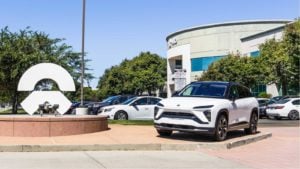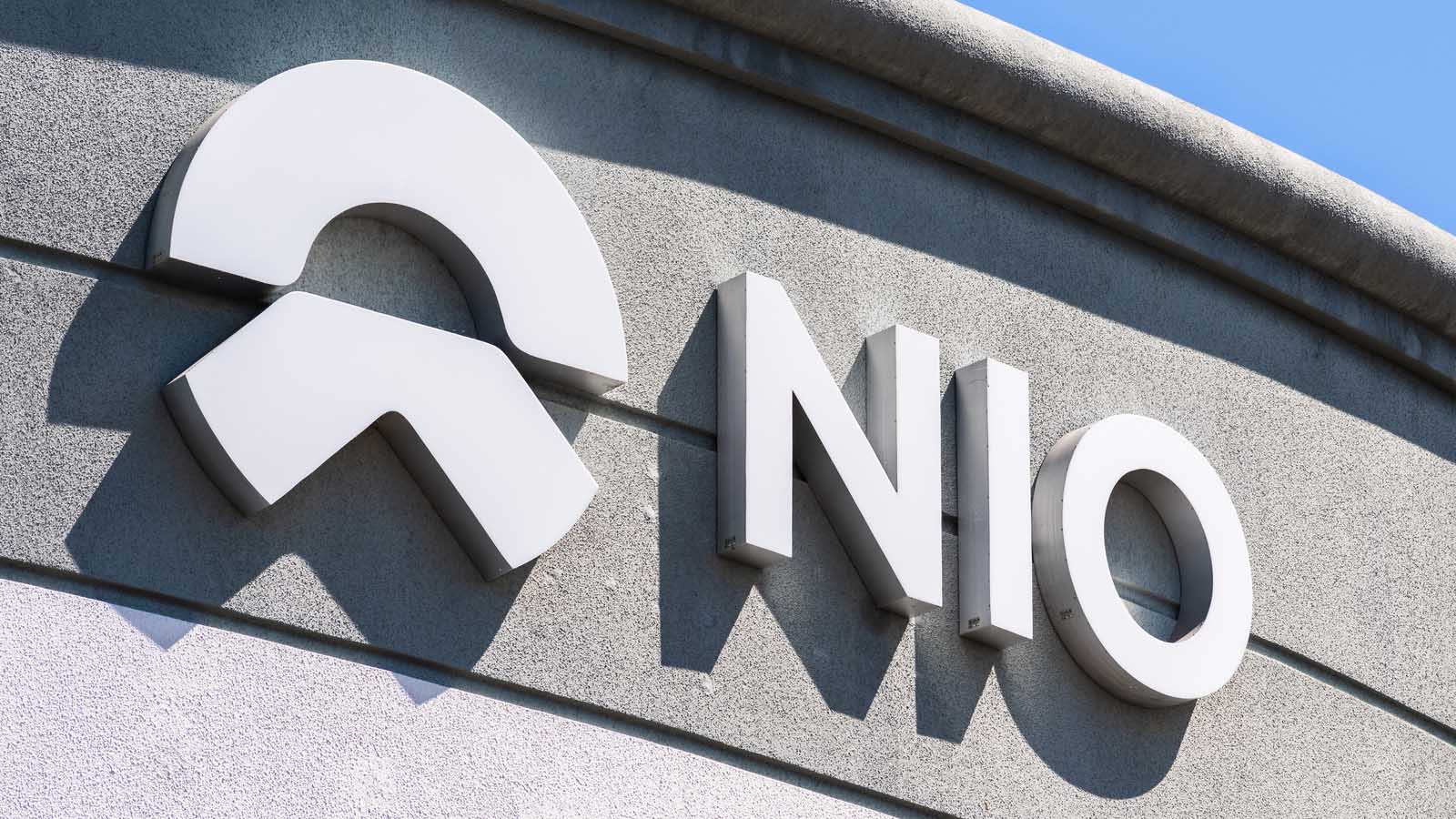Editor’s note: This story has been updated from its original version to provide new analysis and expand on the context of the “NIO House.”
Nio (NYSE:NIO) stock enchanted U.S. investors this year. As investors have scrambled to find “the next Tesla (NASDAQ:TSLA),” shares in Nio have skyrocketed 415%. But there’s one problem:

Nio isn’t Tesla.
Instead, Nio (known as Wèilái in China) faces far stiffer competition than Tesla ever did. With at least 14 other electric vehicle manufacturers in China, it will take far more than wishful thinking for Nio shareholders to win.
Nio Stock: Fighting for Chinese Market Share
Don’t get me wrong. I love the electric vehicle space.
It’s a business growing at 25% per year where winners will generate 1,000%-type returns for smart investors. And the Chinese automotive industry today looks much like America’s booming one of the 1950s when the number of U.S. registered cars doubled.
However, the booming U.S. auto industry also saw many losers. Between 1946 and 1960, the U.S. saw at least 27 major auto companies fold. The list includes famous names like AMC, to stranger ones like the Aurora, named by some auto historians as “the ugliest car ever.”
Today, Nio faces a similar landscape.
Carsalesbase, an industry tracker, counts no fewer than 91 Chinese car brands with more than 1,000 sales in 2019. As the No. 62 brand in China (that’s not a misprint), Nio is sandwiched by No. 61 Qorus and No. 63 Oushan Cos, brands barely known outside China.
Can Nio win? Very possibly. Car reviewers have given the company’s new ES6 SUV decent reviews. Nio also managed to grow sales by 12,000 units in 2019, representing a 158% increase.
But will Nio win? That depends on changing Chinese customer tastes, something far harder to predict.
The Chinese Auto Market: Ready for a Shakeout
History hasn’t been kind to auto manufacturers. Remember the golden era of U.S. auto manufacturing in the 1950s? By 2019, the number of U.S. brands had fallen to just eight. Including foreign ones, American consumers now buy only 34 different car brands.
Returns in the industry are also meager. No major car manufacturer has earned its cost of capital over the past decade.
Chinese auto manufacturers are facing the same fate. In 2019, 42 car brands saw sales declines of 20% or more in China. Even major players like Leopaard Motors and Huansu saw sales plummet 60% as customers shifted attention to other companies. (At its peak, Huansu sold almost 270,000 cars annually). That long list of 91 Chinese car brands will certainly dwindle over the next several years.
In other words, Chinese car buyers have a lot of choices and not all car brands will survive.
That’s the reason why, even in a great industry, I will only pick the companies with the highest chances of success.
What About Nio?
Nio stock fans like to think of Wèilái as “the next Tesla.”
It’s not.
Want proof? Let’s compare Nio in 2019 to Tesla in 2014. That’s the year TSLA sold 22,000 electric vehicles, roughly the same number that Nio did in 2019. But that’s where the similarities end.
Tesla saw colossal demand: Analysts at the time estimated the company had a nine-month backlog. Demand was so extreme that websites popped up so Tesla buyers could ask each other where they were in line. Nio, however, struggled to fill its order books during the coronavirus pandemic, something Tesla hasn’t had trouble with.
Gross margin: TSLA generated a 27% gross margin in 2014. Nio, on the other hand, recorded a -15% gross margin in 2019. The figure improved to 3% in the first half of 2020, but that means Nio can still barely get customers to pay what their SUVs cost to produce.
Competition: Nio counts at least 14 competitors in the electric SUV space, including SAIC, Audi, Mercedes Benz (OTCMKTS:DMLRY) and Li Auto (NASDAQ:LI). Nio also contends with BYD (OTCMKTS:BYDDF), the 800-pound gorilla of the Chinese EV world. Founded in 2003, the Warren Buffett-backed company has become the No. 15 largest car brand in China. In April alone, BYD sold 12,262 plug-in EVs.
Taken together, this suggests “Wèilái” fails to capture the Chinese consumer the same way that Tesla did in 2014.
Does Nio Have a Secret Sauce?
Nio doesn’t produce its own cars. Instead, the car company contracts with state-owned Jianghuai Automobile Group (JAC) for production. Terms, however, are particularly onerous. Not only must Nio pay per vehicle produced, but they also must compensate JAC for any operating losses that JAC itself generates.
Die-hard fans of Nio stock would twist this negative into a positive, calling the company a “lifestyle brand.” To them, it’s a benefit that the company doesn’t own its production facilities – why bother if you’re a pure-bred brand? Indeed, Nio also sells clothing, merchandise, and even offers the experience of its “Nio House,” which it bills as “a space for NIO’s users and friends.”
And success as a lifestyle brand would certainly bring riches to investors. LVMH (OTCMKTS:LVMUY), the company that owns Louis Vuitton, Hennessey, and other high-end brands, is worth $241 billion. Nio reaching that valuation means a 10x gain for investors.
But investors should remember that these are tall mountains to climb.
Firstly, success in a crowded auto industry is already challenging; Tesla managed through Elon Musk’s herculean effort in fundraising and creating a distinctly desirable car. Nio, on the other hand, has had trouble wowing consumers. Underwhelmed users claim Nio’s ES8 SUV travels just 186 miles on a single charge (vs. Tesla’s Model X’s range of 320-350 miles)
Secondly, success as a lifestyle brand will prove even more taxing. Hundreds of formerly shining brands, from Umbro and Ecko Unlimited, are now housed in penny stocks.
Can Nio Become the Next Tesla?
Certainly. Imagine a world where $52,000 “Wèilái” SUVs trundle down U.S. streets. One where American and European consumers eschew Teslas, BMWs and Audis in favor of a better, faster, cheaper, more desirable Chinese import.
Can you imagine that?
Because that’s what it would take for Nio to become the next Tesla: worldwide popularity.
Let’s turn to a 2-stage DCF model to see what’s at stake. To reach Tesla’s $400 billion market capitalization (i.e., become “the next Tesla”), Nio would have to increase sales to 3.42 trillion Yuan by 2029 while earning BMW’s 13% EBITDA margin.
To give Nio the benefit of the doubt, I’ll assume the company’s capital expenditure will decrease to 6.1%, depreciation charges decrease to a more manageable 3%, and de-minimis stock dilution. We’ll also assume its premium price tag remains at $52,000 per unit …
… That means Nio would have to sell around 9.71 million units annually. That’s 60% more than the top-3 makers, Volkswagen (OTCMKTS:VWAGY), Honda (NYSE:HMC) and Toyota (NYSE:TM), sold combined in China in 2019. The Chinese auto market is massive, but it’s still finite. As for becoming the next Tesla, Elon Musk & Co. do not sell 9.71 million cars either. And Tesla’s Model 3 is the second-most popular EV in China. The company is already worth as much as Ford Motor (NYSE:F), so TSLA needs global growth to push its stock up another 10x. So Nio’s fair value comes in higher because:
1) Tesla’s $400 million valuation also has some lofty expectations baked in.
2) Nio’s cash flows have to get discounted back an extra six years.
In other words, the only way for Nio to become the next Tesla (assuming they’re going to stay a car manufacturer) is to take a flyer from Tesla’s playbook and expand internationally. But suppose you have trouble imagining Nio shifting 500,000 “Wèilái” units worldwide every year. In that case, you’re better off finding another EV company like Workhorse (NASDAQ:WKHS), Nikola (NASDAQ:NKLA), or Li Auto that might.
The Bottom Line
Whether Nio stock rises or falls 10% today or tomorrow is a technician’s game (and one that I know how to play). But if you’re looking for 10x-100x returns in the Chinese electric vehicle market, then pause a moment.
The next Tesla won’t just dominate the Chinese EV market. It will have to dominate the world.
On the date of publication, Tom Yeung did not have (either directly or indirectly) any positions in the securities mentioned in this article.
Tom Yeung, CFA, is a registered investment advisor on a mission to bring simplicity to the world of investing.
